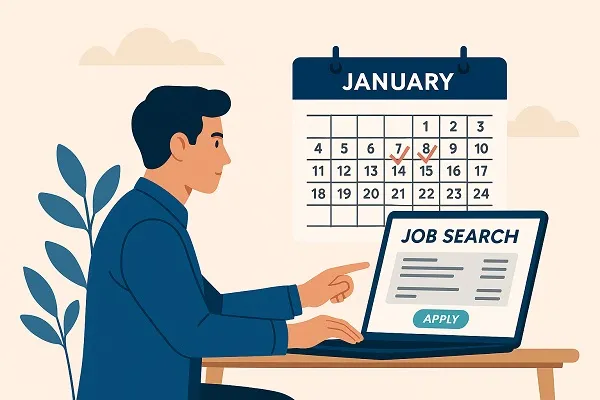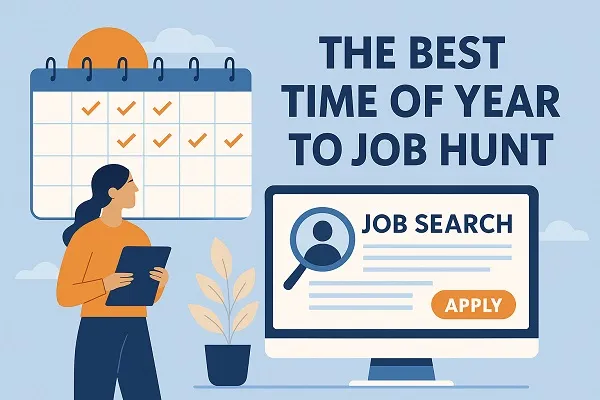The best time of year to job hunt depends on when employers are most active and when new opportunities are most likely to appear. Understanding seasonal hiring patterns helps you plan your search strategically, improving your chances of landing interviews and offers faster.
How Seasonal Hiring Patterns Influence Opportunities
Hiring activity follows a yearly rhythm. Companies adjust their recruitment schedules based on budgets, project timelines, and market conditions. Recognizing these cycles allows you to focus your energy at the right times.
- January to March: One of the most active hiring periods as new budgets open.
- April to June: Hiring continues strong, especially in seasonal and growth industries.
- July to August: A slowdown occurs due to vacations and midyear planning.
- September to November: A second hiring wave before the holiday season.
- December: Quiet for most industries but offers occasional openings.
These cycles vary by industry, but overall, being aware of timing helps you make smarter job search decisions.
January to March: The Best Months to Start Your Job Search

The first quarter of the year is widely recognized as the best time to job hunt. Companies finalize their budgets and begin executing new goals, creating numerous openings.
Why Early-Year Hiring Is So Strong
- Hiring managers return from holiday breaks and focus on staffing.
- Departments receive new funding and clear direction for expansion.
- Recruiters are motivated to meet annual targets quickly.
This makes January through March ideal for launching or accelerating your job search efforts.
Spring Hiring: April to June Momentum

Spring often continues the strong momentum of early-year hiring. Companies aim to fill roles before the summer lull and graduation season introduces new talent.
Benefits of Job Hunting in Spring
- More openings: Businesses that delayed hiring earlier in the year resume recruiting.
- Fresh opportunities: Some industries, like education, retail, and hospitality hire heavily during this period.
- Active networking: Spring brings industry conferences and professional meetups where you can make valuable connections.
Spring is a great time to secure interviews while competition remains manageable.
The Summer Slowdown: July and August

Summer months tend to be quieter for hiring. Decision-makers are often away, and many companies pause their search until the fall. However, this downtime can work to your advantage.
How to Use Summer Strategically
- Update and refine your resume and LinkedIn profile.
- Build new professional connections through casual networking.
- Research employers and set alerts for upcoming roles.
- Improve your skills or certifications to stay competitive.
Even though job postings are fewer, staying proactive in summer ensures you’re ready when hiring accelerates again.
Fall Surge: September to November Hiring Activity

Fall marks the second-biggest hiring wave of the year. Companies push to fill positions before the year ends or before the holiday season slows operations.
Why Fall Job Hunting Pays Off
- Unused hiring budgets must be spent before year-end.
- Managers seek to finalize staffing plans for upcoming projects.
- Many sectors, including finance, education, and marketing, experience seasonal demand.
Fall is also an excellent time to target full-time positions that start in January.
December: Hidden Opportunities in a Quiet Month

December is usually slower for recruitment, but there are still unique openings if you remain alert. Some organizations need to fill urgent roles before closing the books for the year.
Tips for December Job Seekers
- Apply to last-minute openings. fewer candidates mean less competition.
- Attend professional and social gatherings that can lead to networking opportunities.
- Prepare your materials and schedule for the January hiring wave.
Persistence during December can set you apart from other candidates who pause their search.
Industry-Specific Hiring Timelines
Different sectors operate on their own cycles. Understanding these timelines helps tailor your approach.
- Education: Hiring peaks in spring and early summer for the next academic year.
- Retail and hospitality: Surge before holidays or vacation seasons.
- Finance and accounting: Increased hiring in fall and winter for fiscal year-end.
- Technology and healthcare: Maintain steady recruitment but still align with annual budgets.
Researching your industry’s trends helps you act when demand is highest.
Staying Prepared Year-Round
Even if hiring slows, preparation should never stop. Being job-ready when opportunities appear gives you a crucial advantage.
Productive Actions During Slow Periods
- Monitor job boards and company websites consistently.
- Review your resume and ensure it’s optimized with relevant keywords.
- Expand your professional network through LinkedIn or local events.
- Track your applications and progress monthly to stay focused.
Consistency and preparation ensure you’re always positioned to move when the right opportunity appears.
The Power of Timing and Persistence
The best time of year to job hunt aligns with key hiring waves, early in the year and again in the fall. However, success also depends on steady effort throughout the year. By understanding when employers are most active and using slower months to prepare, you’ll stand out when new opportunities arise. Strategic timing, persistence, and preparation together lead to stronger results and a faster path to your next great job.
Content reviewed and published by Tier2Tek Staffing Editorial Team .

